2022届高中英语二轮复习语法专项第01讲冠词&名词讲义教案
文档属性
| 名称 | 2022届高中英语二轮复习语法专项第01讲冠词&名词讲义教案 | 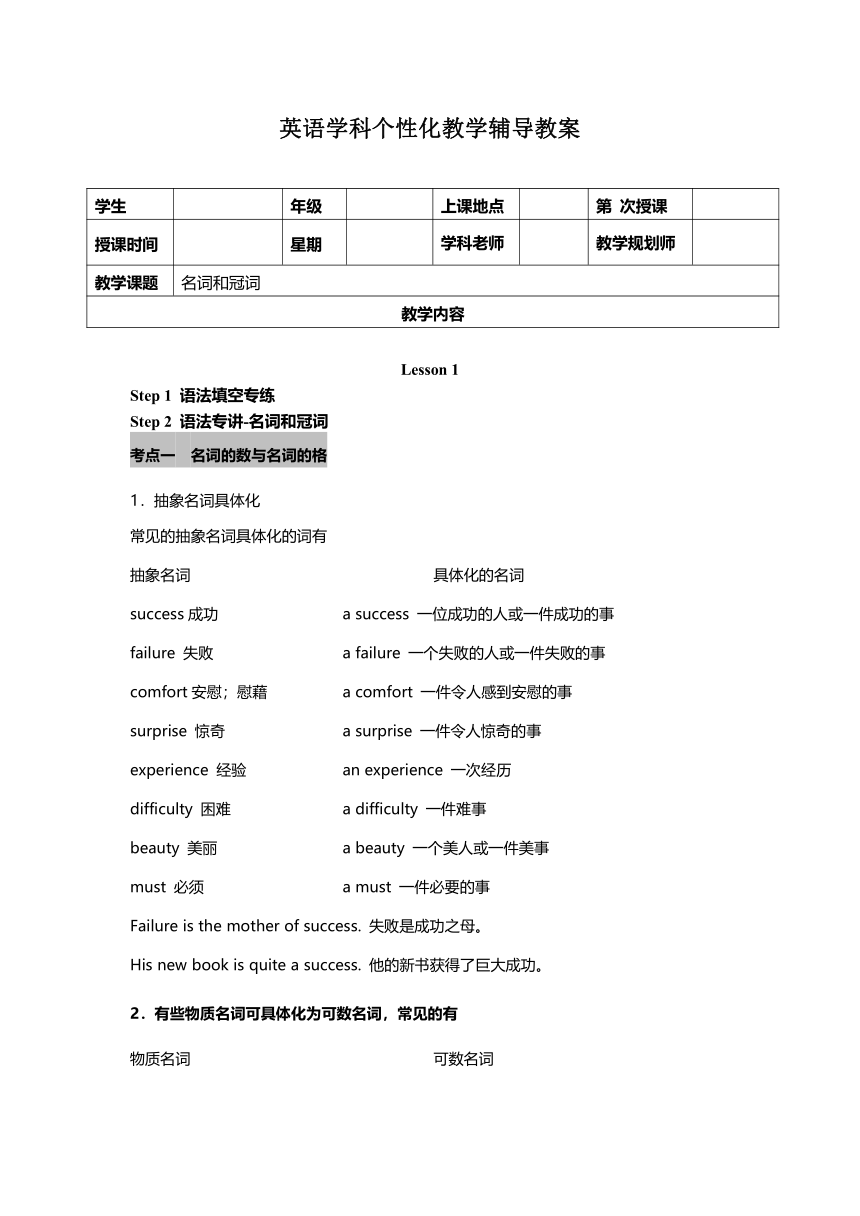 | |
| 格式 | zip | ||
| 文件大小 | 23.6KB | ||
| 资源类型 | 教案 | ||
| 版本资源 | 人教版(2019) | ||
| 科目 | 英语 | ||
| 更新时间 | 2022-02-04 20:24:50 | ||
图片预览

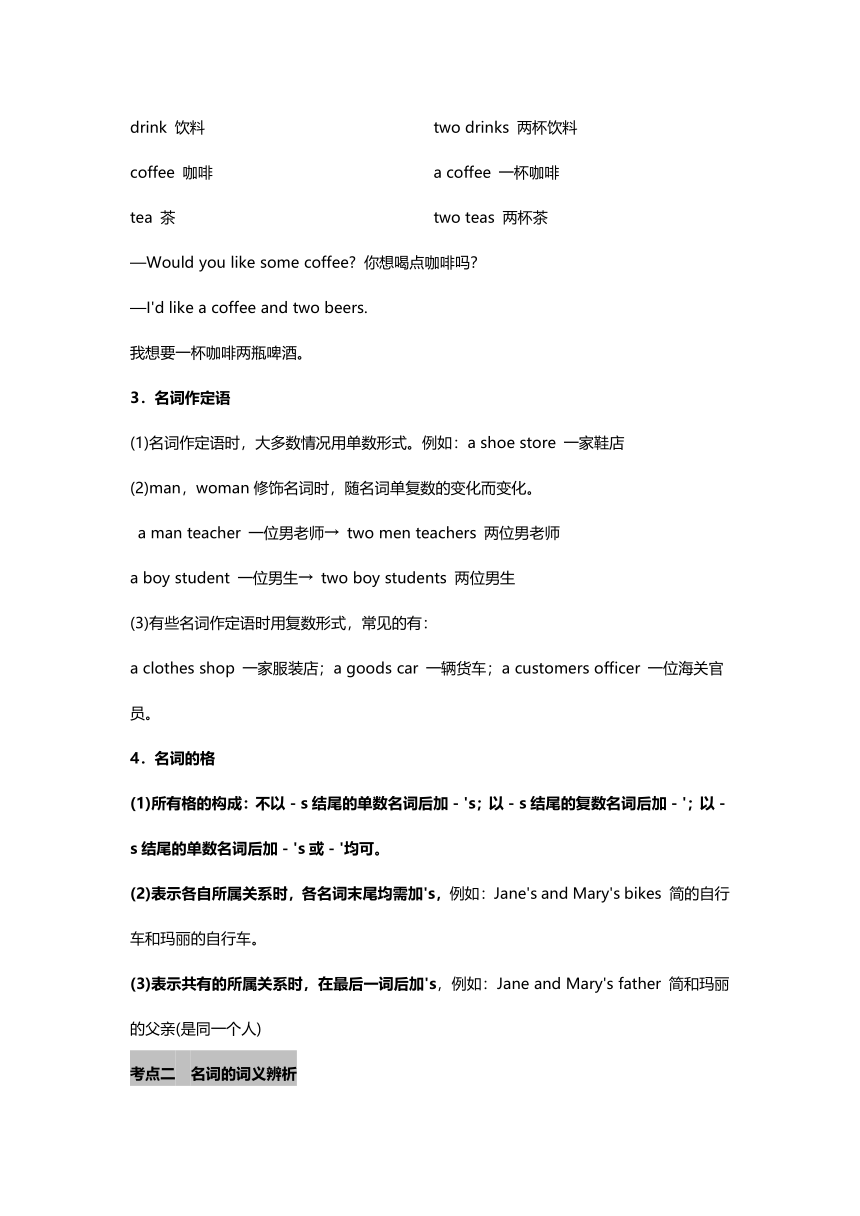
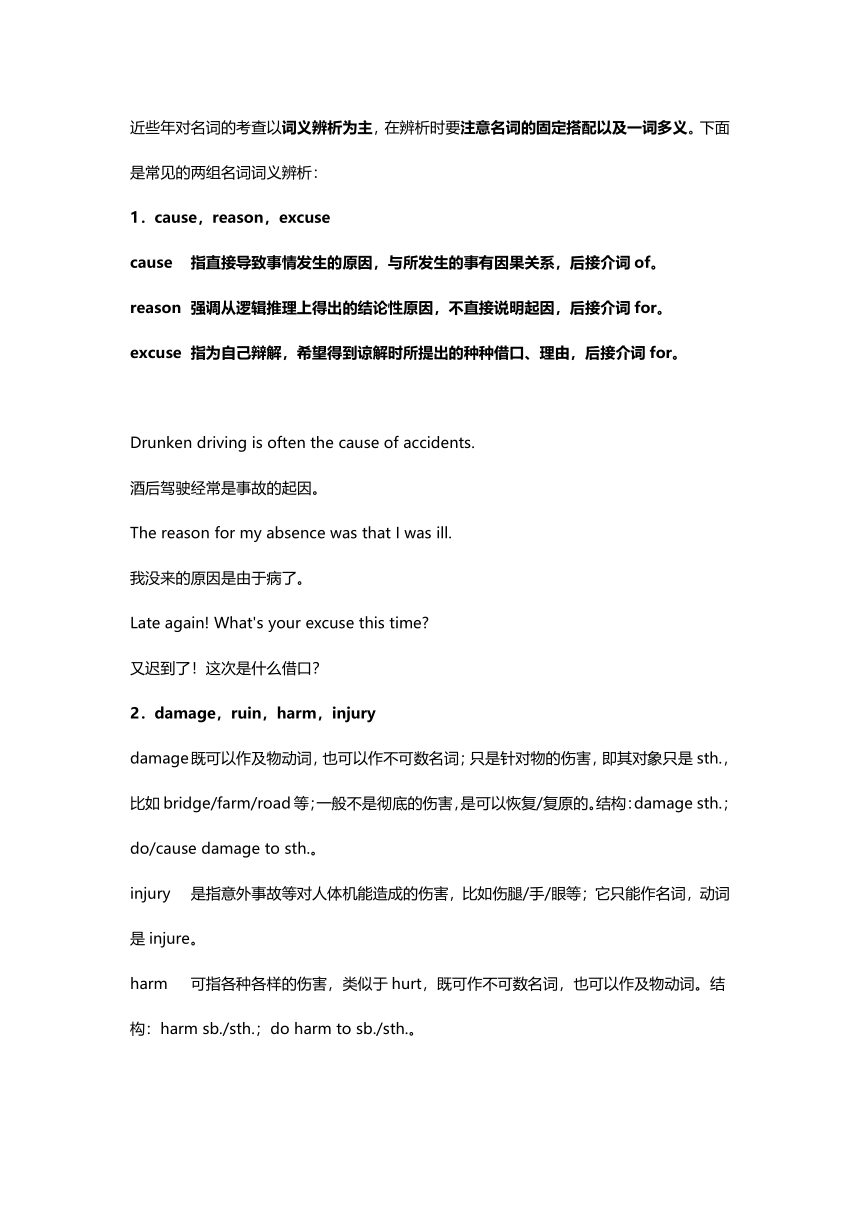
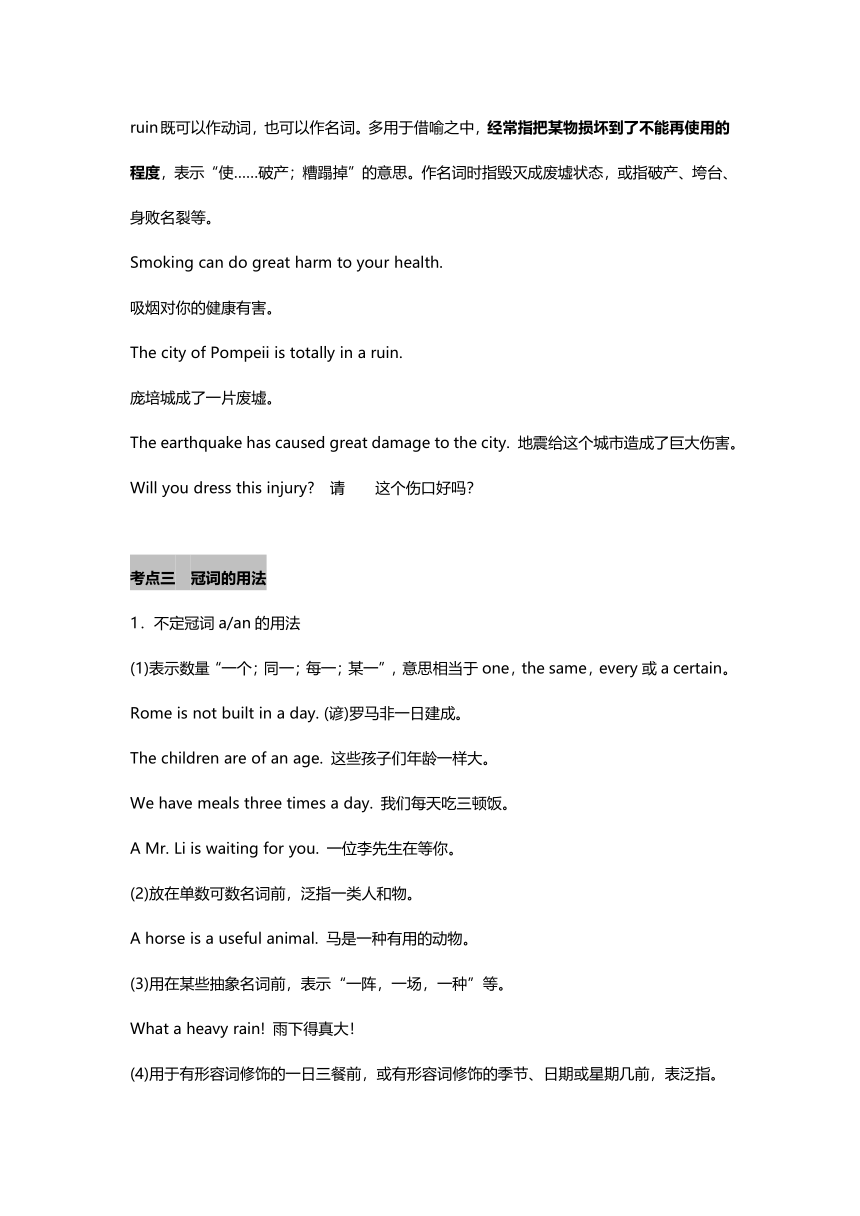
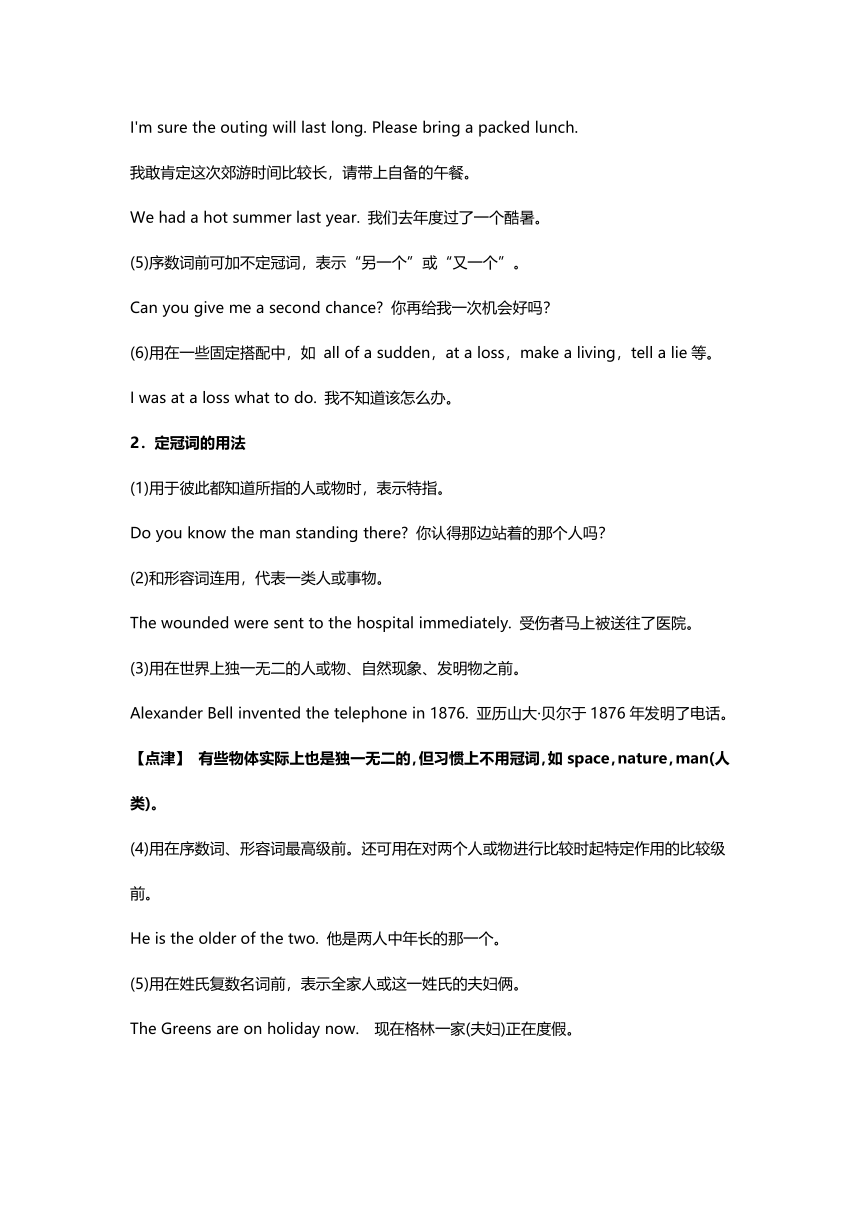
文档简介
英语学科个性化教学辅导教案
学生 年级 上课地点 第 次授课
授课时间 星期 学科老师 教学规划师
教学课题 名词和冠词
教学内容
Lesson 1
Step 1 语法填空专练
Step 2 语法专讲-名词和冠词
考点一 名词的数与名词的格
1.抽象名词具体化
常见的抽象名词具体化的词有
抽象名词 具体化的名词
success成功 a success 一位成功的人或一件成功的事
failure 失败 a failure 一个失败的人或一件失败的事
comfort安慰;慰藉 a comfort 一件令人感到安慰的事
surprise 惊奇 a surprise 一件令人惊奇的事
experience 经验 an experience 一次经历
difficulty 困难 a difficulty 一件难事
beauty 美丽 a beauty 一个美人或一件美事
must 必须 a must 一件必要的事
Failure is the mother of success. 失败是成功之母。
His new book is quite a success. 他的新书获得了巨大成功。
2.有些物质名词可具体化为可数名词,常见的有
物质名词 可数名词
drink 饮料 two drinks 两杯饮料
coffee 咖啡 a coffee 一杯咖啡
tea 茶 two teas 两杯茶
—Would you like some coffee 你想喝点咖啡吗?
—I'd like a coffee and two beers.
我想要一杯咖啡两瓶啤酒。
3.名词作定语
(1)名词作定语时,大多数情况用单数形式。例如:a shoe store 一家鞋店
(2)man,woman修饰名词时,随名词单复数的变化而变化。
a man teacher 一位男老师→ two men teachers 两位男老师
a boy student 一位男生→ two boy students 两位男生
(3)有些名词作定语时用复数形式,常见的有:
a clothes shop 一家服装店;a goods car 一辆货车;a customers officer 一位海关官员。
4.名词的格
(1)所有格的构成:不以-s结尾的单数名词后加-'s;以-s结尾的复数名词后加-';以-s结尾的单数名词后加-'s或-'均可。
(2)表示各自所属关系时,各名词末尾均需加's,例如:Jane's and Mary's bikes 简的自行车和玛丽的自行车。
(3)表示共有的所属关系时,在最后一词后加's,例如:Jane and Mary's father 简和玛丽的父亲(是同一个人)
考点二 名词的词义辨析
近些年对名词的考查以词义辨析为主,在辨析时要注意名词的固定搭配以及一词多义。下面是常见的两组名词词义辨析:
1.cause,reason,excuse
cause 指直接导致事情发生的原因,与所发生的事有因果关系,后接介词of。
reason 强调从逻辑推理上得出的结论性原因,不直接说明起因,后接介词for。
excuse 指为自己辩解,希望得到谅解时所提出的种种借口、理由,后接介词for。
Drunken driving is often the cause of accidents.
酒后驾驶经常是事故的起因。
The reason for my absence was that I was ill.
我没来的原因是由于病了。
Late again! What's your excuse this time
又迟到了!这次是什么借口?
2.damage,ruin,harm,injury
damage 既可以作及物动词,也可以作不可数名词;只是针对物的伤害,即其对象只是sth.,比如bridge/farm/road等;一般不是彻底的伤害,是可以恢复/复原的。结构:damage sth.;do/cause damage to sth.。
injury 是指意外事故等对人体机能造成的伤害,比如伤腿/手/眼等;它只能作名词,动词是injure。
harm 可指各种各样的伤害,类似于hurt,既可作不可数名词,也可以作及物动词。结构:harm sb./sth.;do harm to sb./sth.。
ruin 既可以作动词,也可以作名词。多用于借喻之中,经常指把某物损坏到了不能再使用的程度,表示“使……破产;糟蹋掉”的意思。作名词时指毁灭成废墟状态,或指破产、垮台、身败名裂等。
Smoking can do great harm to your health.
吸烟对你的健康有害。
The city of Pompeii is totally in a ruin.
庞培城成了一片废墟。
The earthquake has caused great damage to the city. 地震给这个城市造成了巨大伤害。
Will you dress this injury 请包扎这个伤口好吗?
考点三 冠词的用法
1.不定冠词a/an的用法
(1)表示数量“一个;同一;每一;某一”,意思相当于one,the same,every或a certain。
Rome is not built in a day. (谚)罗马非一日建成。
The children are of an age. 这些孩子们年龄一样大。
We have meals three times a day. 我们每天吃三顿饭。
A Mr. Li is waiting for you. 一位李先生在等你。
(2)放在单数可数名词前,泛指一类人和物。
A horse is a useful animal. 马是一种有用的动物。
(3)用在某些抽象名词前,表示“一阵,一场,一种”等。
What a heavy rain! 雨下得真大!
(4)用于有形容词修饰的一日三餐前,或有形容词修饰的季节、日期或星期几前,表泛指。
I'm sure the outing will last long. Please bring a packed lunch.
我敢肯定这次郊游时间比较长,请带上自备的午餐。
We had a hot summer last year. 我们去年度过了一个酷暑。
(5)序数词前可加不定冠词,表示“另一个”或“又一个”。
Can you give me a second chance 你再给我一次机会好吗?
(6)用在一些固定搭配中,如 all of a sudden,at a loss,make a living,tell a lie等。
I was at a loss what to do. 我不知道该怎么办。
2.定冠词的用法
(1)用于彼此都知道所指的人或物时,表示特指。
Do you know the man standing there 你认得那边站着的那个人吗?
(2)和形容词连用,代表一类人或事物。
The wounded were sent to the hospital immediately. 受伤者马上被送往了医院。
(3)用在世界上独一无二的人或物、自然现象、发明物之前。
Alexander Bell invented the telephone in 1876. 亚历山大·贝尔于1876年发明了电话。
【点津】 有些物体实际上也是独一无二的,但习惯上不用冠词,如space,nature,man(人类)。
(4)用在序数词、形容词最高级前。还可用在对两个人或物进行比较时起特定作用的比较级前。
He is the older of the two. 他是两人中年长的那一个。
(5)用在姓氏复数名词前,表示全家人或这一姓氏的夫妇俩。
The Greens are on holiday now. 现在格林一家(夫妇)正在度假。
(6)用在逢10的数词的复数形式之前,指世纪的某个年代,如in the 1990s在二十世纪九十年代。
(7)用在以festival组成的中国传统节日之前,但以day组成的节日前不加定冠词;在表示演奏的西洋乐器的名词前通常用定冠词,但中国传统乐器前不加定冠词。试比较:
in the Spring Festival 在春节;on Christmas Day 在圣诞节
play the piano 弹钢琴;play erhu 演奏二胡
(8)用在表示计量的名词前,如by the day,by the hour,by the dozen等,表示“按照……”;但如果表示单位的名词为不可数名词前面不加定冠词,如by weight,by height等。
(9)用在一些固定搭配中,如in the end,on the whole,on the spot等。
The thief was caught on the spot. 小偷当场被抓。
3.零冠词的用法
(1)季节、月份、星期、节日、学科名称、球类、棋类名词前不加冠词。
January 1st is New Year's Day. 一月一日是新年。
I like physics though it is a little difficult. 我喜欢物理,尽管学起来有些难。
(2)表示独一无二的职位、职务的名词用作表语、同位语或补足语时。
We made Jack monitor of our class. 我们选杰克为班长。
(3)连系动词turn后的表语单数可数名词前不用冠词,但名词前若有形容词作定语时,则必须用冠词。
Lu Xun was a doctor before he turned writer. 鲁迅成为作家前是医生。
(4)表示交通工具的名词与by连用,不指具体某辆车,而是作为工具时。
He goes to school by bike every day. 他每天骑自行车上学。
(5)as,though引导的倒装的让步状语从句中的名词移至句首时不用冠词。
Child as he is, he plays the violin very well. 尽管他是个孩子,但小提琴拉得很好。
(6)用在一些固定搭配中,如at war,in place of,take place等。
I will give you this lesson in place of Mr. Wang. 我代替王老师给你们上这堂课。
4.一些短语中有无冠词的区别
①at table在吃饭;at the table在桌子旁
②at school上学;at the school在学校
③in hospital/prison住院/坐牢;in the hospital/prison在医院/在监狱里
④by day白天; by the day按日计算
⑤take place发生;take the place of取代
⑥in charge of掌管;in the charge of在……掌管之中
⑦in front of在……的前面;in the front of在……的前面部分
⑧out of question毫无疑问;out of the question不可能
He is in charge of the factory. 他负责这个工厂。
The factory is in the charge of him. 这个工厂由他负责。
考点四 语法填空考查冠词
透析 知识清单 考点警示 在语法填空中,冠词的考查是高频考点之一,解题时,如果在名词前设空,(即便是名词前有形容词修饰),名词前一般都要填入冠词。例如:
1.“In the beginning,there was only very small amount of unfairness in the world,but everyone added a little,...”
2.But she quickly realized that it wasn't her,and it was probably the fact that she sat in __the__ last row.
3.I sat next to the man and introduced myself. We had __an__ amazing conversation.
4.A young man,while traveling through a desert,came across a spring of clear water.__The__ water was sweet.
5.Besides,shopping at this time of the year was not __a__ pleasant experience:people stepped on your feet...
确定要填入冠词后,一定要结合上下文语境,根据冠词的基本用法,填入不定冠词(a或an),或定冠词(the),近几年来还没有考查过零冠词,但也要引起考生的注意,不可忽略。
1.冠词的位置
(1)冠词与名词连用,总是置于名词之前,有形容词修饰名词,也置于名词前,如
The potato is a vegetable,not a fruit.
In the train,we found an empty thirdclass carriage.
(2)形容词前有so,as,too,how修饰时,不定冠词a须置于形容词之后、名词之前,如
It was so warm a day that we decided to go to the sea.
(3)指示代词such与感叹词what总是置于不定冠词a之前,如:
However did you make such a mistake What a lovely day!
(4)副词quite,rather常置于不定冠词a之前。
(5)不定代词all,both和副词double须置于定冠词the之前,如:All the birds were asleep.
冠词:例题解析
1.I have joined ________ health club across the street to get in ________ shape.
A. the; / B. a; / C. the; the D. a; a
2.There is ________ small temple on the island, which can only be reached by ________ water.
A. a; / B. a; the C. the; the D. the; /
3.When my sister left ________ college, she got a job as ________ reporter in a newspaper office
A. a; the B. /; a C. the; the D. a; /
4.Doctor Zhang, an honest expert on ________ subject, will give us a lecture on nationwide water shortage ________ next Friday.
A. the; / B. the; the C. a; / D. a; the
5.What ________ pity that you must leave now! It is such ________ great fun to have dinner with you.
A. a; a B. a; the C. /; a D. a; /
6.David Cameron was elected ________ Prime Minister to lead Britain to ________ new time.
A. /; a B. the; a C. a; the D. a; /
7.The Smiths don't usually like staying at ________ hotels, but last summer they spent a few days at a very nice hotel by ________ sea.
A. /; a B. the; the C. /; the D. the; a
8.After John graduated from the university he went to ________ hospital and turned ________ doctor.
A. the; a B. the; / C. /; a D. /; /
9.In my mind, no such ________ thing in our country as the Great Wall can stand for the image and ________ culture of China.
A. a; the B. a; / C. /; the D. /; /
学生 年级 上课地点 第 次授课
授课时间 星期 学科老师 教学规划师
教学课题 名词和冠词
教学内容
Lesson 1
Step 1 语法填空专练
Step 2 语法专讲-名词和冠词
考点一 名词的数与名词的格
1.抽象名词具体化
常见的抽象名词具体化的词有
抽象名词 具体化的名词
success成功 a success 一位成功的人或一件成功的事
failure 失败 a failure 一个失败的人或一件失败的事
comfort安慰;慰藉 a comfort 一件令人感到安慰的事
surprise 惊奇 a surprise 一件令人惊奇的事
experience 经验 an experience 一次经历
difficulty 困难 a difficulty 一件难事
beauty 美丽 a beauty 一个美人或一件美事
must 必须 a must 一件必要的事
Failure is the mother of success. 失败是成功之母。
His new book is quite a success. 他的新书获得了巨大成功。
2.有些物质名词可具体化为可数名词,常见的有
物质名词 可数名词
drink 饮料 two drinks 两杯饮料
coffee 咖啡 a coffee 一杯咖啡
tea 茶 two teas 两杯茶
—Would you like some coffee 你想喝点咖啡吗?
—I'd like a coffee and two beers.
我想要一杯咖啡两瓶啤酒。
3.名词作定语
(1)名词作定语时,大多数情况用单数形式。例如:a shoe store 一家鞋店
(2)man,woman修饰名词时,随名词单复数的变化而变化。
a man teacher 一位男老师→ two men teachers 两位男老师
a boy student 一位男生→ two boy students 两位男生
(3)有些名词作定语时用复数形式,常见的有:
a clothes shop 一家服装店;a goods car 一辆货车;a customers officer 一位海关官员。
4.名词的格
(1)所有格的构成:不以-s结尾的单数名词后加-'s;以-s结尾的复数名词后加-';以-s结尾的单数名词后加-'s或-'均可。
(2)表示各自所属关系时,各名词末尾均需加's,例如:Jane's and Mary's bikes 简的自行车和玛丽的自行车。
(3)表示共有的所属关系时,在最后一词后加's,例如:Jane and Mary's father 简和玛丽的父亲(是同一个人)
考点二 名词的词义辨析
近些年对名词的考查以词义辨析为主,在辨析时要注意名词的固定搭配以及一词多义。下面是常见的两组名词词义辨析:
1.cause,reason,excuse
cause 指直接导致事情发生的原因,与所发生的事有因果关系,后接介词of。
reason 强调从逻辑推理上得出的结论性原因,不直接说明起因,后接介词for。
excuse 指为自己辩解,希望得到谅解时所提出的种种借口、理由,后接介词for。
Drunken driving is often the cause of accidents.
酒后驾驶经常是事故的起因。
The reason for my absence was that I was ill.
我没来的原因是由于病了。
Late again! What's your excuse this time
又迟到了!这次是什么借口?
2.damage,ruin,harm,injury
damage 既可以作及物动词,也可以作不可数名词;只是针对物的伤害,即其对象只是sth.,比如bridge/farm/road等;一般不是彻底的伤害,是可以恢复/复原的。结构:damage sth.;do/cause damage to sth.。
injury 是指意外事故等对人体机能造成的伤害,比如伤腿/手/眼等;它只能作名词,动词是injure。
harm 可指各种各样的伤害,类似于hurt,既可作不可数名词,也可以作及物动词。结构:harm sb./sth.;do harm to sb./sth.。
ruin 既可以作动词,也可以作名词。多用于借喻之中,经常指把某物损坏到了不能再使用的程度,表示“使……破产;糟蹋掉”的意思。作名词时指毁灭成废墟状态,或指破产、垮台、身败名裂等。
Smoking can do great harm to your health.
吸烟对你的健康有害。
The city of Pompeii is totally in a ruin.
庞培城成了一片废墟。
The earthquake has caused great damage to the city. 地震给这个城市造成了巨大伤害。
Will you dress this injury 请包扎这个伤口好吗?
考点三 冠词的用法
1.不定冠词a/an的用法
(1)表示数量“一个;同一;每一;某一”,意思相当于one,the same,every或a certain。
Rome is not built in a day. (谚)罗马非一日建成。
The children are of an age. 这些孩子们年龄一样大。
We have meals three times a day. 我们每天吃三顿饭。
A Mr. Li is waiting for you. 一位李先生在等你。
(2)放在单数可数名词前,泛指一类人和物。
A horse is a useful animal. 马是一种有用的动物。
(3)用在某些抽象名词前,表示“一阵,一场,一种”等。
What a heavy rain! 雨下得真大!
(4)用于有形容词修饰的一日三餐前,或有形容词修饰的季节、日期或星期几前,表泛指。
I'm sure the outing will last long. Please bring a packed lunch.
我敢肯定这次郊游时间比较长,请带上自备的午餐。
We had a hot summer last year. 我们去年度过了一个酷暑。
(5)序数词前可加不定冠词,表示“另一个”或“又一个”。
Can you give me a second chance 你再给我一次机会好吗?
(6)用在一些固定搭配中,如 all of a sudden,at a loss,make a living,tell a lie等。
I was at a loss what to do. 我不知道该怎么办。
2.定冠词的用法
(1)用于彼此都知道所指的人或物时,表示特指。
Do you know the man standing there 你认得那边站着的那个人吗?
(2)和形容词连用,代表一类人或事物。
The wounded were sent to the hospital immediately. 受伤者马上被送往了医院。
(3)用在世界上独一无二的人或物、自然现象、发明物之前。
Alexander Bell invented the telephone in 1876. 亚历山大·贝尔于1876年发明了电话。
【点津】 有些物体实际上也是独一无二的,但习惯上不用冠词,如space,nature,man(人类)。
(4)用在序数词、形容词最高级前。还可用在对两个人或物进行比较时起特定作用的比较级前。
He is the older of the two. 他是两人中年长的那一个。
(5)用在姓氏复数名词前,表示全家人或这一姓氏的夫妇俩。
The Greens are on holiday now. 现在格林一家(夫妇)正在度假。
(6)用在逢10的数词的复数形式之前,指世纪的某个年代,如in the 1990s在二十世纪九十年代。
(7)用在以festival组成的中国传统节日之前,但以day组成的节日前不加定冠词;在表示演奏的西洋乐器的名词前通常用定冠词,但中国传统乐器前不加定冠词。试比较:
in the Spring Festival 在春节;on Christmas Day 在圣诞节
play the piano 弹钢琴;play erhu 演奏二胡
(8)用在表示计量的名词前,如by the day,by the hour,by the dozen等,表示“按照……”;但如果表示单位的名词为不可数名词前面不加定冠词,如by weight,by height等。
(9)用在一些固定搭配中,如in the end,on the whole,on the spot等。
The thief was caught on the spot. 小偷当场被抓。
3.零冠词的用法
(1)季节、月份、星期、节日、学科名称、球类、棋类名词前不加冠词。
January 1st is New Year's Day. 一月一日是新年。
I like physics though it is a little difficult. 我喜欢物理,尽管学起来有些难。
(2)表示独一无二的职位、职务的名词用作表语、同位语或补足语时。
We made Jack monitor of our class. 我们选杰克为班长。
(3)连系动词turn后的表语单数可数名词前不用冠词,但名词前若有形容词作定语时,则必须用冠词。
Lu Xun was a doctor before he turned writer. 鲁迅成为作家前是医生。
(4)表示交通工具的名词与by连用,不指具体某辆车,而是作为工具时。
He goes to school by bike every day. 他每天骑自行车上学。
(5)as,though引导的倒装的让步状语从句中的名词移至句首时不用冠词。
Child as he is, he plays the violin very well. 尽管他是个孩子,但小提琴拉得很好。
(6)用在一些固定搭配中,如at war,in place of,take place等。
I will give you this lesson in place of Mr. Wang. 我代替王老师给你们上这堂课。
4.一些短语中有无冠词的区别
①at table在吃饭;at the table在桌子旁
②at school上学;at the school在学校
③in hospital/prison住院/坐牢;in the hospital/prison在医院/在监狱里
④by day白天; by the day按日计算
⑤take place发生;take the place of取代
⑥in charge of掌管;in the charge of在……掌管之中
⑦in front of在……的前面;in the front of在……的前面部分
⑧out of question毫无疑问;out of the question不可能
He is in charge of the factory. 他负责这个工厂。
The factory is in the charge of him. 这个工厂由他负责。
考点四 语法填空考查冠词
透析 知识清单 考点警示 在语法填空中,冠词的考查是高频考点之一,解题时,如果在名词前设空,(即便是名词前有形容词修饰),名词前一般都要填入冠词。例如:
1.“In the beginning,there was only very small amount of unfairness in the world,but everyone added a little,...”
2.But she quickly realized that it wasn't her,and it was probably the fact that she sat in __the__ last row.
3.I sat next to the man and introduced myself. We had __an__ amazing conversation.
4.A young man,while traveling through a desert,came across a spring of clear water.__The__ water was sweet.
5.Besides,shopping at this time of the year was not __a__ pleasant experience:people stepped on your feet...
确定要填入冠词后,一定要结合上下文语境,根据冠词的基本用法,填入不定冠词(a或an),或定冠词(the),近几年来还没有考查过零冠词,但也要引起考生的注意,不可忽略。
1.冠词的位置
(1)冠词与名词连用,总是置于名词之前,有形容词修饰名词,也置于名词前,如
The potato is a vegetable,not a fruit.
In the train,we found an empty thirdclass carriage.
(2)形容词前有so,as,too,how修饰时,不定冠词a须置于形容词之后、名词之前,如
It was so warm a day that we decided to go to the sea.
(3)指示代词such与感叹词what总是置于不定冠词a之前,如:
However did you make such a mistake What a lovely day!
(4)副词quite,rather常置于不定冠词a之前。
(5)不定代词all,both和副词double须置于定冠词the之前,如:All the birds were asleep.
冠词:例题解析
1.I have joined ________ health club across the street to get in ________ shape.
A. the; / B. a; / C. the; the D. a; a
2.There is ________ small temple on the island, which can only be reached by ________ water.
A. a; / B. a; the C. the; the D. the; /
3.When my sister left ________ college, she got a job as ________ reporter in a newspaper office
A. a; the B. /; a C. the; the D. a; /
4.Doctor Zhang, an honest expert on ________ subject, will give us a lecture on nationwide water shortage ________ next Friday.
A. the; / B. the; the C. a; / D. a; the
5.What ________ pity that you must leave now! It is such ________ great fun to have dinner with you.
A. a; a B. a; the C. /; a D. a; /
6.David Cameron was elected ________ Prime Minister to lead Britain to ________ new time.
A. /; a B. the; a C. a; the D. a; /
7.The Smiths don't usually like staying at ________ hotels, but last summer they spent a few days at a very nice hotel by ________ sea.
A. /; a B. the; the C. /; the D. the; a
8.After John graduated from the university he went to ________ hospital and turned ________ doctor.
A. the; a B. the; / C. /; a D. /; /
9.In my mind, no such ________ thing in our country as the Great Wall can stand for the image and ________ culture of China.
A. a; the B. a; / C. /; the D. /; /
